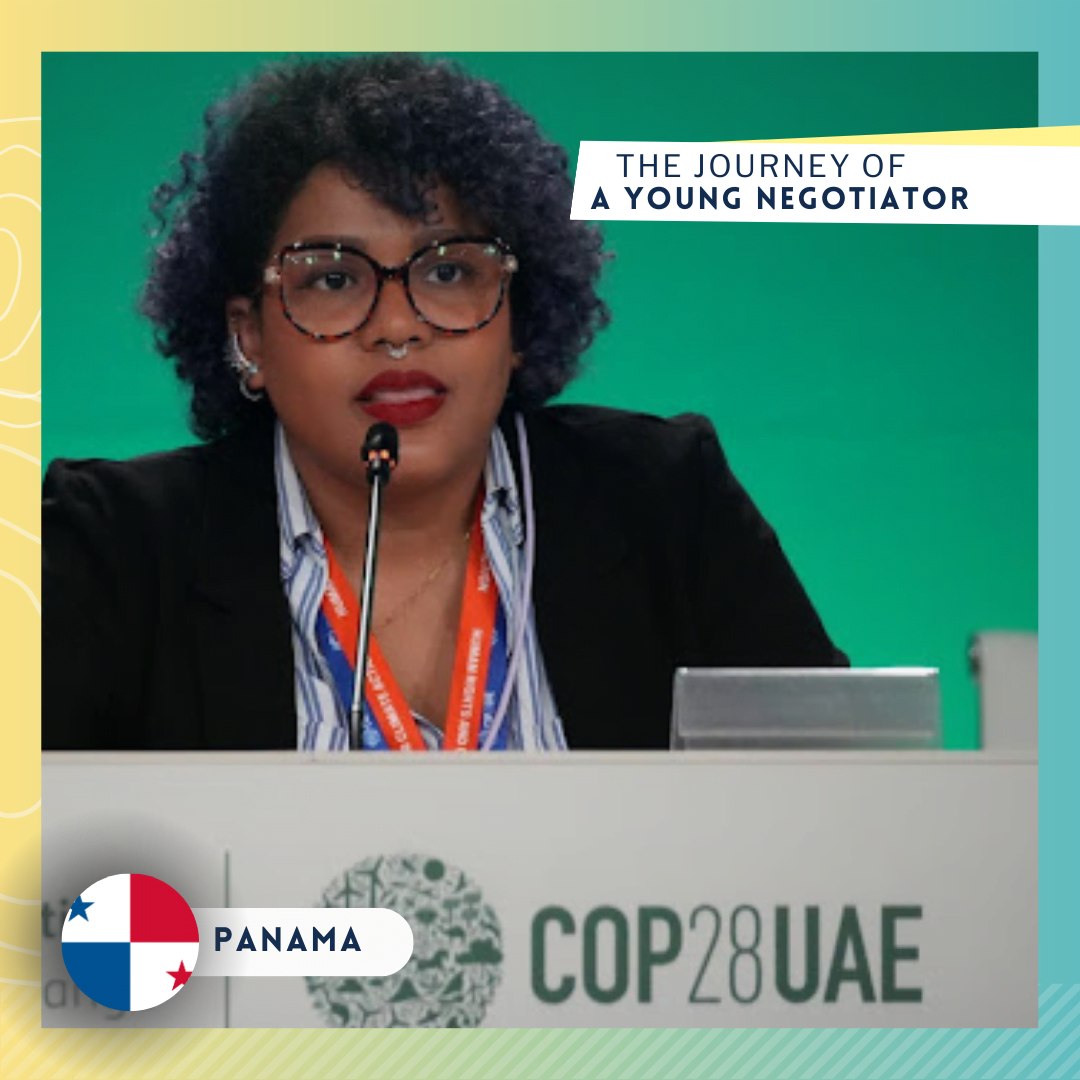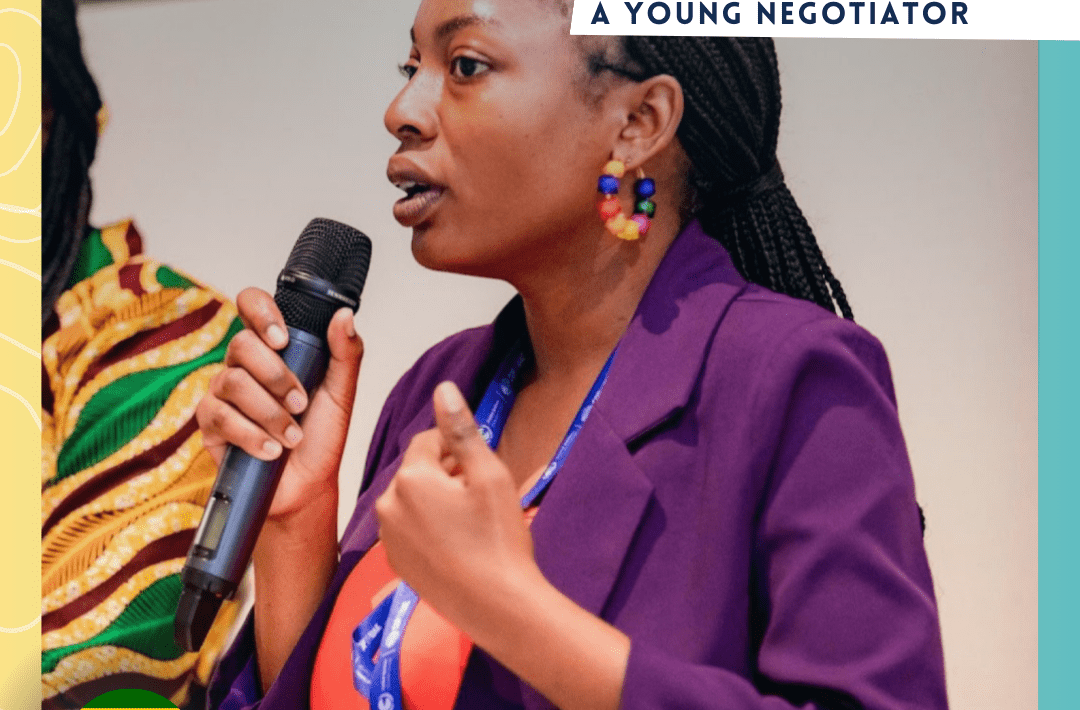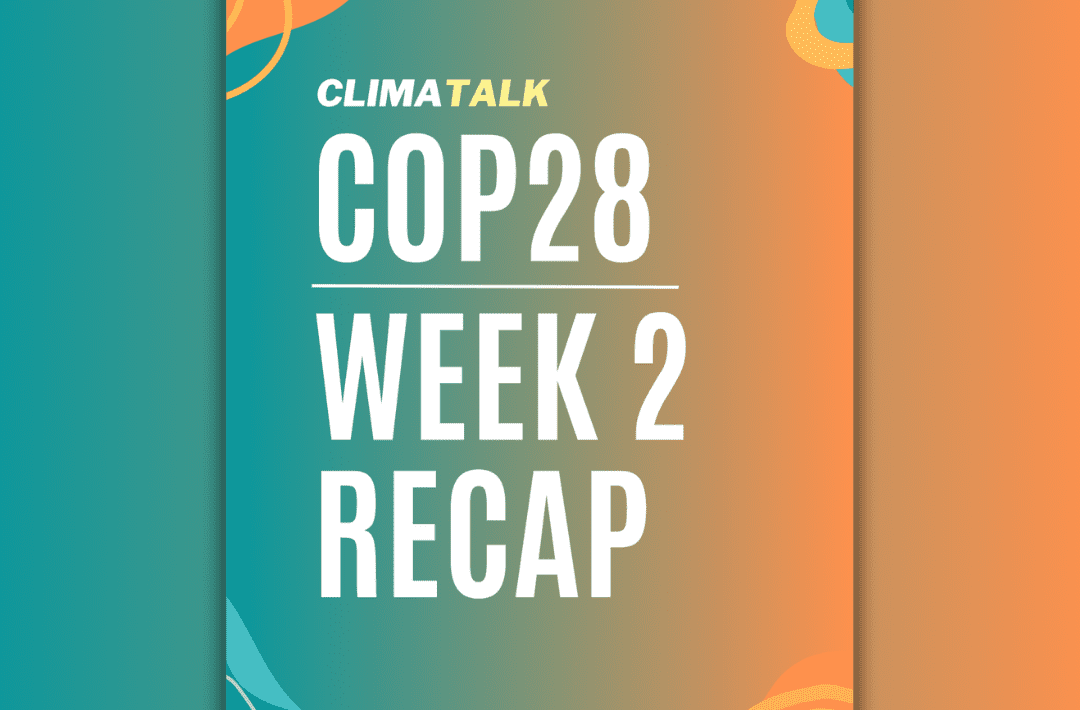
Guest Feature: My experience as a young negotiator for Panama
By Carol Patricia – Simon González
This is a guest feature by Carol Patricia and Simon González, two young negotiators from the Climate Youth Negotiators Programme under the Youth Negotiators Academy.
Presenting the Results of the World Café Section during the COP 28 ACE Event: Empowering a Fair, Inclusive and Just Transition on 10th December 2023. Copyright to the ACE Team of UNFCCC.
Introduction
By profession, I am an Environmental Engineer, Specialist in Project Management and Waste Management. I have been part of Panama’s delegation to the UNFCCC since 2021 and coordinate the negotiation topics on Gender, Action for Climate Empowerment (ACE) and Capacity Building. As a young negotiator aware that I will not be young forever, I hope to be part of the people who support generational renewal and knowledge transfer.
I write this article in a personal way and don’t expect it to be an article written in a supremely professional way; I want to tell you my story as if you were by my side and we were lifelong friends.
How I started getting involved in climate policy
To be able to tell you about my beginnings in climate policy, we must go back to 2019. Pay close attention.
By 2019, I had already started a startup called Eco Ideas, and I was making my way as an independent through it. It happens that in 2020 with the pandemic, many of the opportunities that I was about to start could not be followed through with, because the organizations that were going to hire me to start projects had to close. Back then, I started polishing communication skills such as speaking on camera, designing presentations, and designing virtual learning spaces. One day through a WhatsApp group, which for Spanish-speaking readers would like to be read as “el grupito de wassap”, they shared the opportunity of an internship at the Ministry of Environment of Panama for the Directorate of Climate Change.
And I said to myself, “it’s a good opportunity to learn and access information that I would hardly be able to access on a daily basis.” The truth is that at that time I had not worked on anything related to Climate Change, but on environmental issues, waste management and sustainability. For the internship, I was assigned to support the digitization of the Climate Change Academy for Young Leaders, which was usually held in person but cancelled due to the pandemic; and they also asked me for support to carry out the National Plan for Gender and Climate Change.
Here I pause to clarify that I entered as an intern having years of experience as a professional and engineer. Friends told me that I was too dumb to “give away” my time instead of getting paid and that it made me look bad as a professional. I didn’t think so because somehow I was having an opportunity at a time when everything was paralyzed, and I could gain knowledge that I didn’t have.
Continuous.
I embraced both projects, and gave it my all. Although it is true that I did not receive a salary, I really loved being involved, I contributed the communication skills that I had already been perfecting and I brought the experience and wondering that I already had. ittle by little, the Climate Change Directorate team gave me the opportunity to get involved in other initiatives and in 2021, through a project they were running with the United Nations Development Program, I was hired.
Getting involved in other initiatives included the climate negotiations. I had no idea what that world was and what to expect. I participated virtually in the 2021 SBs on capacity building topics and was able to share with experts in the field. I was hooked. I learned then about the importance of countries participating as actively as possible in international decision-making spaces and the importance of generating installed capacity. I have been able to participate in 3 COPs, in one as coordinator of the logistics of the Panama Pavilion (COP26) and in two as lead negotiator under the themes of Gender, Action for Climate Empowerment (ACE) and Capacity Building (COP27 and COP28).
I want you to know that I started in this “climate world” when I was 27 years old. I expected to have “the success I have now” at almost 40s, I say this without wanting to offend people who are part of this age group, because I really saw it as something far away. But I had the wisdom to take advantage of the opportunity and to be surrounded by a team that sees the potential in young people and did not hesitate to involve them.
And that’s how I started my career in climate policy and all things related to climate change. Today, I have been able to create workshops and trainings aimed at the private and public sectors, civil society, NGOs and young people. Adapting scientific material in an understandable language is what has characterized me, and it has allowed me to connect a complex world to people’s daily lives. Today, I am working on being able to make a path for the generations that follow me, providing accessibility to the opportunities to which I once had access, since I will not be young all my life and I have the responsibility of helping other young people to occupy spaces and that they can not only be able to use their voice to demand actions but also be the ones who can execute solutions. Generational renewal, the transfer of technology and knowledge, is crucial.
If you are wondering what happened to Eco Ideas (www.ecoideaspa.com), my small business became a hybrid advisory platform specializing in accompanying companies that seek sustainability and resilience to climate change, where I seek to connect sustainability and climate resilience with leaders of small, medium and large companies, so that they can transform their business models and positively impact people and the planet.
I tell my story, because I want to inspire you to think big, to prepare yourself in polishing skills that can distinguish you from other professionals impregnating your personal stamp, to know how to see opportunities and take advantage of them, and to know how to be in the right WhatsApp groups. You don’t know where life can take you when you believe and bet on yourself, and you are grateful to the people who accompany you in your growth as a person and professional.
I would also like to take this opportunity to emphasize how necessary it is for people with more experience and who are in some way part of the decision-making process to allow young people to occupy spaces. Involve time to train them, patience to understand mistakes and correct them, because at some point you too were young and there was someone who believed in you and gave you the opportunity.
My experience as a Young Negotiator so far (speak about past COPs / SBs if you have attended; or your preparation for COP28)
As a negotiator, I can share that I was very nervous the first time I intervened in some SBs, and it was to ask a question. By the time SB56 was developed it was fully virtual in 2021, I was assigned to follow up on the topics of Gender, Climate Empowerment Action (ACE), and Capacity Building. We had been trained to be able to understand what this space was about, but I don’t think I had dimensioned everything that happens in the negotiations and everything that it implies.
The climate negotiations represent a very dynamic and overwhelming space. There’s a lot going on at once and you have to be able to keep up. A pace that can become exhausting and overwhelming, physically, emotionally and mentally.
It was at COP27 in Sharm El Sheikh, Egypt, that I was able to make my first intervention on behalf of Panama, using the flag and being surrounded by people face to face. It’s not the same to be virtual. I remember that I was nervous and trembling with nerves, my voice would break at first. My mother tongue is Spanish and as a second language I speak English. Part of the nerves was the fact that I was there surrounded by experts – and others like me who was learning – saying a word wrong and being made fun of, or not getting my idea across well (it may sound trivial, but part of the fear you have as a negotiator is that you will be made fun of for “not knowing how to speak English”). However, I found that in that mix of people from all over the world there was empathy, and although it is true that each one was in favor of defending the interests of their country, they helped one to be able to raise the idea and had the patience to listen. We know that in negotiations for those who do not have English as their mother tongue it can be a challenging situation, but it doesn’t take away from the fact that you let your position know and can defend it.
As time goes by, you will think that the nerves are gone, but no, I still get nervous even though I don’t tremble anymore and my voice doesn’t break anymore. I have focused on being able to listen carefully to the positions of other colleagues and seek conciliation between the Parties. I’m aware that most of us are driven by the fact that climate change affects everyone and it is important to find the middle ground so that we can work on 197 parts together. For this I always use the analogy of wanting to make 5 people meet to go to dinner, all the effort that it takes to reach an agreement and for that meeting to happen. We are talking about bringing together 197 parties with their different idiosyncrasies and interests, and the patience that one must work for that reconciliation to take place.
I have gained friendships in the international community. I’ve been able to meet negotiators who are role models for me, I try to meet with young negotiators like me and also with expert negotiators. The experts have all the baggage and information – with whom I joke that they have the complete gossip – about how the negotiations have taken place since day 1 and that can give details that we younger people may not take into account due to our inexperience. And the latter was what I used for SBs 58 and COP28.
Being able to rely on one’s own delegation and also on colleagues from other countries is what allows me to have three negotiating tracks. There is a reality and that is that in small delegations a negotiator must follow several issues.
It is key to have colleagues from the negotiating bloc to support you to be able to follow up on a meeting in which you could not be, because you had to attend another. There is the possibility of giving feedback and bringing voices into the negotiation spaces. This is part of the dynamism I mentioned at the beginning, and part of why it can be physically, emotionally and mentally exhausting to be in these spaces.
There’s a lot to study and a lot to learn by watching your colleagues perform. Having friendships in this process also helps maintain sanity. For COP28, I attribute my success in developing it in part to the community created by CYNP and the spaces that were created to be able to share what our day was like and have someone from the team who reminded me to eat and drink water.
I will always be grateful to the people I have been able to connect, because in some way I have learned from them.
My learnings from COP28 (surprises, successes, disappointments, something I’m proud of…)
Now it’s time to share what I learned from COP28. And I anticipate that there were many things that were mixed but I will highlight 3 of them.
Isolating yourself is not recommended at all. Creating meaningful connections is important. I’m not referring to the technical part because we agree that relating on a professional level is key, I mean that human part in which one creates friendship. I embrace the act of creating friendship and community. One can belong to as many communities as possible, and that probably doesn’t measure the impact on the mood it exerts on oneself. It is important to remember that you are still human and that you have the need to share with your peers.
Something that disappointed me during this COP was to realize that there are those who are moved by personal interests over collective interests, and that decisions and actions that lead to something concrete are not being made. It is imperative to remind ourselves that the decisions made now are affecting the present and future of humanity.
I end with something of which I am supremely proud, and that is how from AILAC, a negotiating bloc of which Panama is a part, the Gender Coordination has been working together and seeking co-creation with countries from the 5 regions, in order to have a Gender Action Plan that brings together the interests of all. That rapprochement that was proposed to have during COP28 is the duty of the negotiations. That there is openness to work collaboratively because humanity needs it.
I hope you enjoyed this read, and it inspires you to take action. Either as a young person, or a person with a little more years of experience that allows the growth of the younger ones.
ABOUT THE YOUTH NEGOTIATORS ACADEMY
YNA is the umbrella initiative under which the Climate Youth Negotiators Programme is being delivered as its first major programme. The YNA is a global, intergenerational initiative aimed at redressing the systemic under-representation of young people in decision making by empowering and enabling young people to become climate change negotiators for their countries. See here for more information.



